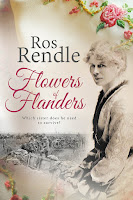This month on Yesterday Uncovered we slip back to WW1 to commemorate the 100th anniversary of the end of the Great War
During November there will be three authors talking about their books set in this period and one very special guest.
Website: http://deborahcarr.org/
During November there will be three authors talking about their books set in this period and one very special guest.
Sitting,
in the shade, on a recliner at the side of my pool is Deborah Carr, the author
of, Broken Faces, so please help yourself to a glass of chilled bubbly, a plate
of tapas, then make yourself comfortable and enjoy slipping back to the time of
WW1
Tell us a little
about yourself
Thanks
for inviting me, Pauline, it’s great to be here.
I
live on the island of Jersey and can see the French coast from my bedroom
window at night. My husband and I share our home with our three rescue dogs and
my family believe that I’m slowly filling my house with these rescues to make
up for my two children, now 27 and 24 having left home – I think they could be
right.
I’ve
written for years and Broken Faces was my debut novel set during WW1.
HarperImpulse recently published my second novel set partially during this
period, The Poppy Field, to commemorate the centenary of the end of WW1. I also
write contemporary romance series as Georgina Troy and psychological suspense
as Ella Drummond.
What inspired you to
write about and around WW1?
My
paternal great-grandfather, 2nd Lt Charles Wood of the 17th
Lancers served in India, where my grandmother was born, and also in WW1. He
died just before Christmas in 1922 and my great-grandmother was so upset that
he’d left her – poor man, it wasn’t by choice – that she burnt all his photos.
I was researching his life looking for a photo for my father who apparently
looks like him. I never found that photo, but did find a love of the period and
having ridden horses when I was growing up, setting a novel during the four
years of that war about two cavalrymen and the two women in their lives seemed
to make sense.
Tell us little about
the story and its plot without giving too much away
The
story is about four friends and how their lives are changed forever during the
1914-1918 war. Freddie Chevalier, is a farmer’s son from Jersey. He joins the
Lancers to be with his closest school friend, Charles Baldwyn, a rather badly-behaved
man from an aristocratic family. One of them is terribly injured. Charles is
engaged to Meri, a wealthy American girl who Freddie is secretly in love with.
Something happens between Meri and Freddie, which devastates Charles. Charles’
younger sister, Lexi is in love with Freddie, but although he’s fond of her, he
still sees her as his best-friend’s younger sister, rather than the beautiful
woman she has become. Meri becomes a nurse and Lexi a volunteer in the war
effort and each of them soon discover that war is far more shocking than they
had imagined.
Is any part of the
story based on facts / real events?
I
like to keep true to historical facts and always hope that a reader will not
only enjoy reading my books but discover things they hadn’t previously known. I
work out what historical events I would like to include in the book and write
the story around them.
Are any of the
characters based on someone real or are they pure fiction?
I’ve
based Freddie on my paternal great-grandfather in that he’s in the Lancers and
they’re both very good looking (or so we were told by my grandmother) and
blonde. Charles’ family live at a beautiful estate in Shropshire and although
none of the characters are like my ex-husband, his family do have a lovely
estate and I based the Somerton Hall in the book on their home.
If research was
necessary what did this involve?
I
did a lot of research and took over a year to write this book. The hardest part
about the research is what to leave out. Very little ends up in the book, but
the research does help ensure that an essence of the period filters into the story,
so the reader can have a sense of how it was to live during that time.
I
did a lot of research online, some through very old books that I sourced
through charitable book sales. I also visited Paris and was lucky enough to
discover and be allowed into the building where the plaster-of-Paris masks
written about in my book were made. It was surreal and memorable experience
walking through the passage way, into a peaceful courtyard and up the wooden
stairs retracing the steps of men from one hundred years ago as they went to
have the plaster of Paris casts made of their damaged faces from which their
masks were then made.
Thank you for stopping by and meeting Deborah.
Until next time, I hope the sun is shinning on your face and in your heart.
Pauline x









No comments:
Post a Comment